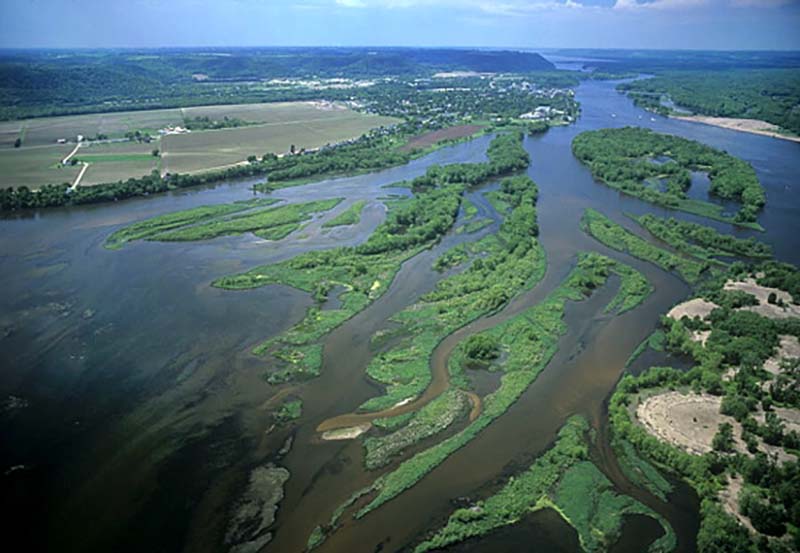Coalition to Restore 5,435 Acres of Mississippi River Floodplain
More than $ 9 million of funding will help conserve the confluence of the Mississippi, Illinois, Missouri, and Ohio Rivers
More than $ 9 million of funding will help conserve the confluence of the Mississippi, Illinois, Missouri, and Ohio Rivers

Ducks Unlimited (DU) will receive a $3 million North American Wetlands Conservation Act (NAWCA) grant and over $6 million in matching partner funds to preserve and protect 5,435 acres of bottomland floodplain along the Mississippi River.
Illinois Clean Energy Community Foundation, Apex Clean Energy, Arbor Day Foundation, Phillips 66, the Illinois Department of Natural Resources, Kentucky Department of Fish and Wildlife Resources, and several private landowners are partnering with DU on this expansive project.
The conservation work will stretch from the Mississippi’s confluence with the Illinois and Missouri Rivers north of St. Louis to its confluence with the Ohio River at Cairo, Ill., and across the top of the Mississippi Alluvial Valley in southeast Missouri and western Kentucky.
“Protecting historic habitats in this region is critical for staging waterfowl as they prepare to fly further south along their migration,” said Jena Herrick, DU’s manager of conservation programs. “Adding more wetlands along this stretch of the river also protects nearby communities from flooding and improves water quality for residents, wildlife, and fish.”
Aptly named, the Heart of the Big Rivers proposal includes an array of wetland habitat features, including floodplain forests, backwater lakes, basins, sloughs, and ridges and swales, all of which are key components of the bottomlands associated with the Mississippi River and its tributaries.
The conservation efforts will focus on these productive habitats. Several proposed projects are situated at well-known and significant migratory stopovers, such as Swan Lake at Two Rivers National Wildlife Refuge and the Mingo Basin at Mingo National Wildlife Refuge. Additional projects are near or adjacent to these and other public wetland areas, enhancing existing habitat complexes and creating rich landscapes to support migratory birds.
Conserving these habitats will benefit many species, including mallards, wood ducks, red-shouldered hawks, red-headed woodpeckers, warblers, rusty blackbirds and Indiana bats. These efforts will ensure that key migration routes and critical habitat areas continue providing vital wildlife resources.
“Eighty-five percent of the projects will be on public lands, so hunters and recreationists will have access to most of these sites,” said DU Regional Biologist Dane Cramer. “All wetland conservation work helps better manage the resource, but it’s an added bonus when the general public can see the improvements DU and its partners are making.”
During this latest round of funding, the Department of the Interior approved over $46.2 million to conserve or restore 91,425 acres of wetland and upland habitats for waterfowl, shorebirds, and other bird species across 17 states. These grants, provided through NAWCA, will be supplemented by more than $99.1 million in partner matching funds.
The Commission also approved $11.7 million from the Migratory Bird Conservation Fund. This will enable the U.S. Fish and Wildlife Service and its partners to protect habitats on seven national wildlife refuges. The land acquisitions will enhance public access to hunting, fishing, wildlife observation, and other outdoor recreational activities.
NAWCA is the only federal grant program dedicated to preserving migratory bird wetland habitats. Public and private partners such as landowners, conservation organizations, state, Tribal and local governments, have contributed an additional $4.53 billion in matching funds, resulting in more than $6.8 billion directed toward wetland conservation.
“Since its inception in 1989, more than $2.28 billion in NAWCA grants have funded 3,300 projects across 32.6 million acres of habitat,” said DU CEO Adam Putnam. “With an additional $4.53 billion in matching funds, there’s simply no greater return on investment for the conservation of wetlands and other habitats relied on by waterfowl, other wildlife, and our communities. The tremendous success of this program is a direct result of its consistent, bipartisan support from Congress, and we’re eager to transition this investment into the landscape.”
Media Contact:
Joe Genzel
(309) 453-0979
jgenzel@ducks.org
Ducks Unlimited uses cookies to enhance your browsing experience, optimize site functionality, analyze traffic, and deliver personalized advertising through third parties. By continuing to use this site, you agree to our use of cookies. View Privacy Policy